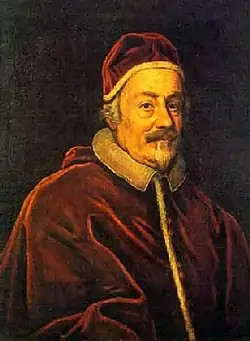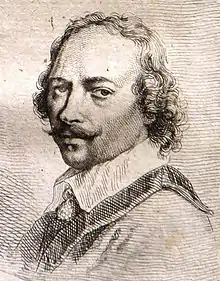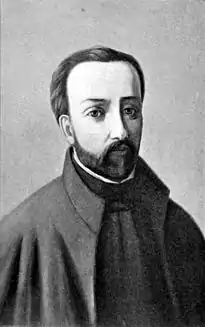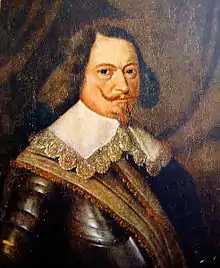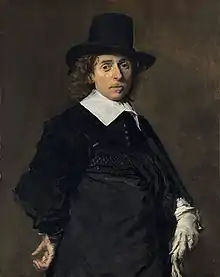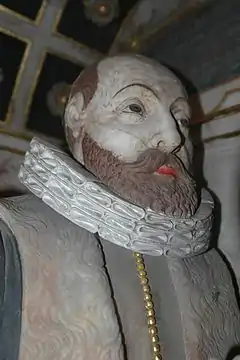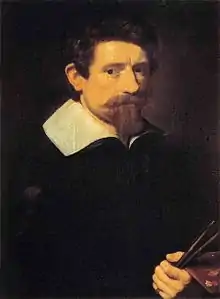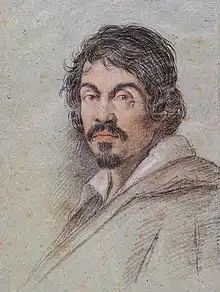1610
1610 (MDCX) was a common year starting on Friday of the Gregorian calendar and a common year starting on Monday of the Julian calendar, the 1610th year of the Common Era (CE) and Anno Domini (AD) designations, the 610th year of the 2nd millennium, the 10th year of the 17th century, and the 1st year of the 1610s decade. As of the start of 1610, the Gregorian calendar was 10 days ahead of the Julian calendar, which remained in localized use until 1923.
| Millennium: | 2nd millennium |
|---|---|
| Centuries: | |
| Decades: | |
| Years: |
| 1610 by topic |
|---|
| Arts and science |
| Leaders |
| Birth and death categories |
| Births – Deaths |
| Establishments and disestablishments categories |
| Establishments – Disestablishments |
| Works category |
|
| Gregorian calendar | 1610 MDCX |
| Ab urbe condita | 2363 |
| Armenian calendar | 1059 ԹՎ ՌԾԹ |
| Assyrian calendar | 6360 |
| Balinese saka calendar | 1531–1532 |
| Bengali calendar | 1017 |
| Berber calendar | 2560 |
| English Regnal year | 7 Ja. 1 – 8 Ja. 1 |
| Buddhist calendar | 2154 |
| Burmese calendar | 972 |
| Byzantine calendar | 7118–7119 |
| Chinese calendar | 己酉年 (Earth Rooster) 4306 or 4246 — to — 庚戌年 (Metal Dog) 4307 or 4247 |
| Coptic calendar | 1326–1327 |
| Discordian calendar | 2776 |
| Ethiopian calendar | 1602–1603 |
| Hebrew calendar | 5370–5371 |
| Hindu calendars | |
| - Vikram Samvat | 1666–1667 |
| - Shaka Samvat | 1531–1532 |
| - Kali Yuga | 4710–4711 |
| Holocene calendar | 11610 |
| Igbo calendar | 610–611 |
| Iranian calendar | 988–989 |
| Islamic calendar | 1018–1019 |
| Japanese calendar | Keichō 15 (慶長15年) |
| Javanese calendar | 1530–1531 |
| Julian calendar | Gregorian minus 10 days |
| Korean calendar | 3943 |
| Minguo calendar | 302 before ROC 民前302年 |
| Nanakshahi calendar | 142 |
| Thai solar calendar | 2152–2153 |
| Tibetan calendar | 阴土鸡年 (female Earth-Rooster) 1736 or 1355 or 583 — to — 阳金狗年 (male Iron-Dog) 1737 or 1356 or 584 |
| Wikimedia Commons has media related to 1610. |
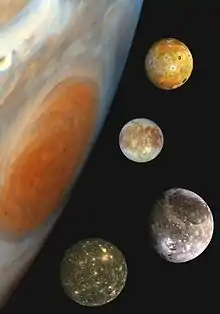
Some have suggested that 1610 may mark the beginning of the Anthropocene, or the 'Age of Man', marking a fundamental change in the relationship between humans and the Earth system, but earlier starting dates (ca. 1000 C.E.) have received broader consensus, based on high resolution pollution records that show the massive impact of human activity on the atmosphere.[1][2][3]
Events
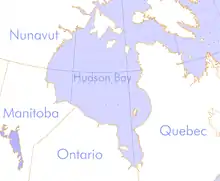
January–June
- January 6 – Nossa Senhora da Graça incident: A Portuguese carrack sinks near Nagasaki, after fighting Japanese samurai for four nights.
- January 7 – Galileo Galilei first observes the four Galilean moons of Jupiter: Ganymede, Callisto, Europa and Io, but is unable to distinguish the latter two until the following day.
- May 14 – François Ravaillac assassinates Henry IV of France who is succeeded by his 8-year-old son Louis XIII.
- May 23 – Jamestown, Virginia: Acting as temporary Governor, Thomas Gates, along with John Rolfe, Captain Ralph Hamor, Sir George Somers, and other survivors from the Sea Venture (wrecked at Bermuda) arrive at Jamestown; they find that 60 have survived the "starving time" (winter), the fort palisades and gates have been torn down, and empty houses have been used for firewood, in fear of attacks by natives outside the fort area.
- May 24 – Jamestown, Virginia: The temporary Governor, Thomas Gates, issues The Divine, Moral, and Martial Laws.
- May 27 – Regicide François Ravaillac is executed by being pulled apart by horses in the Place de Grève, Paris.
- June 7 – Jamestown: Temporary Governor Gates decides to abandon Jamestown.
- June 8 – Jamestown: Temporary Governor Gates' convoy meets the ships of Governor Thomas West, 3rd Baron De La Warr (Delaware) at Mulberry Island.
- June 10 – Jamestown: The convoy of temporary Governor Gates, and the ships of Governor Lord De La Warr, land at Jamestown.
July–December
- July – Monteverdi's Vespro della Beata Vergine (Marian Vespers) are published in Venice.
- July 4 – Polish–Muscovite War – Battle of Klushino: The outnumbered forces of the Polish–Lithuanian Commonwealth defeat the combined Russian and Swedish armies; Polish troops go on to occupy Moscow.
- July 5 – John Guy sets sail from Bristol, with 39 other colonists, for Newfoundland.
- July 9 – Lady Arbella Stuart, a claimant to the throne of England, is imprisoned for clandestinely marrying William Seymour, 2nd Duke of Somerset, another claimant, without royal permission on June 22.[4]
- August 2 – Henry Hudson sails into what is now known as Hudson Bay, thinking he has made it through the Northwest Passage and reached the Pacific Ocean.
- August 9 – Anglo-Powhatan Wars: The English launch a major attack on the Paspahegh village, capturing and executing the native queen and her children, burning houses and chopping down the corn fields; the subsequent use of the term "Paspahegh" in documents refers to their former territory.
- October 9 – Poland, under the command of Hetman Stanisław Żółkiewski, take control of the Kremlin during the Polish–Muscovite War.
- October 17 – Louis XIII of France is crowned.
Date unknown
- The Manchu tribal leader Nurhaci breaks his relations with the Ming dynasty of China, at this time under the aloof and growingly negligent Wanli Emperor; Nurhaci's line later becomes the emperors of the Qing dynasty, which overthrows the short-lived Shun dynasty in 1644, and the remnants of the Ming throne in 1662.
- The Orion Nebula is discovered by Nicolas-Claude Fabri de Peiresc.
- Publication is completed of the Douay–Rheims Bible (The Holie Bible Faithfully Translated into English), a translation of the Bible from the Latin Vulgate into English made by members of the English College, Douai, in the service of the Catholic Church.[5]
- Jakob Böhme experiences another inner vision, in which he believes that he further understands the unity of the cosmos, and that he has received a special vocation from God.
- Work starts on the Wignacourt Aqueduct, in Malta.
- Santa Fe, New Mexico is founded as the oldest city in the state.
- Approximate date – First shipments of tea to Europe, by the Dutch East India Company.
- Winter – Dr. Bonham's Case is decided by Edward Coke, Chief Justice of the Common Pleas of England. Coke affirms the supremacy of the common law, which limits the power of Parliament as well as the king.
- Henri Membertou, Grand Chief of Mi'kmaq nation signs Concordat of 1610, an agreement with the Roman Catholic Church recognizing the Mi'kmaq as an independent nation.
Births
January–March
- January 9 – George Wilde, Irish bishop (d. 1665)
- January 10 – Louis Maimbourg, French Jesuit historian (d. 1686)
- January 12 – Reinhold Curicke, jurist and historian from Danzig (Gdańsk) < (d. 1667)
- January 13 – Archduchess Maria Anna of Austria, Electress of Bavaria (d. 1665)
- January 21 – Elizabeth Fones, American settler (d. 1673)
- January 26 – Henry Hildyard, English Member of Parliament (d. 1674)
- February 2
- Francisco Ignacio Alcina, Jesuit missionary and historian (d. 1674)
- Pierre Bourdelot, French physician (d. 1685)
- Edmund Weaver, English politician (d. 1672)
- February 11 – Salomon Idler, German inventor (d. 1669)
- February 13 – Jean de Labadie, 17th-century French pietist (d. 1674)
- February 14 – Solomon Swale, English politician (d. 1678)
- March 3 – Pierre Dupuis, French painter (d. 1682)
- March 4 (bapt.) – William Dobson, English portraitist and painter (d. 1646)
- March 14
- Frederick Cornwallis, 1st Baron Cornwallis, English politician (d. 1662)
- Simon Louis, Count of Lippe-Detmolt (1627–1636) (d. 1636)
April–June
- April 22 – Pope Alexander VIII (d. 1691)
- May 12 – Arent Berntsen, Norwegian statistician (d. 1680)
- May 17 – Joseph Poncet, French missionary (d. 1675)
- May 18 – Stefano della Bella, Italian printmaker (d. 1664)
- June 1 – Hendrik Martenszoon Sorgh, Dutch painter (d. 1670)
- June 17 – Birgitte Thott, Danish scholar, writer and translator (b. 1662)
- June 24 – Thomas Hales, Connecticut settler (d. 1679)
July–September
- July 2 – Francis Browne, 3rd Viscount Montagu in the Peerage of England (d. 1682)
- July 6 – Hugh Forth, English politician (d. 1676)
- July 8 (bapt.) – Richard Deane, English military commander and regicide (d. 1653)
- July 11 – William Widdrington, 1st Baron Widdrington, English landowner, politician (d. 1651)
- July 14 – Ferdinando II de' Medici, Grand Duke of Tuscany (d. 1670)
- July 18 – Antonio de Solís y Ribadeneyra, Spanish dramatist and historian (d. 1686)
- July 28 (bapt.) – Henry Glapthorne, English dramatist (d. c.1643)
- July 30 – Lorens von der Linde, Swedish field marshal (d. 1670)
- August 2 – Edward Master, English politician (d. 1691)
- August 4 – Cornelis Evertsen the Elder, Dutch admiral (d. 1666)
- August 23 – Susanna Margarete of Anhalt-Dessau, Princess of Anhalt-Dessau (d. 1663)
- September 4 – Giovanni Andrea Sirani, Italian painter (d. 1670)
- September 6
- Francesco I d'Este, Duke of Modena, Italian noble (d. 1658)
- Luke Robinson, English politician (d. 1669)
- David Wemyss, 2nd Earl of Wemyss, Scottish earl (d. 1679)
- September 10 – Sir Edward Seymour, 3rd Baronet, Member of Parliament (d. 1688)
- September 24 – Huang Zongxi, Chinese political theorist, philosopher, naturalist, writer and soldier (d. 1695)
- September 28 – Henry Hastings, 1st Baron Loughborough, English Royalist army commander in the English Civil War (d. 1666)
- September 29 – Gabriel Druillettes, French missionary (d. 1681)
October–December
- October 3 – Gabriel Lalemant, Jesuit missionary in New France, beginning in 1646 (d. 1649)
- October 6 – Charles de Sainte-Maure, duc de Montausier, French soldier, the governor of the Louis (d. 1690)
- October 19 – James Butler, 1st Duke of Ormonde, Anglo-Irish statesman and soldier (d. 1688)
- October 28 – Jacob Kettler, German noble (d. 1682)
- November 8 – Pietro Vidoni, Italian Catholic cardinal (d. 1681)
- November 20 – Henry Heyman, English politician (d. 1658)
- November 22 – Duchess Marie Elisabeth of Saxony (d. 1684)
- November 28 – Augustine Warner, Virginia planter, politician (d. 1674)
- December 9 – Baldassare Ferri, Italian castrato singer (d. 1680)
- December 10 – Adriaen van Ostade, Dutch painter (d. 1685)
- December 15 – David Teniers the Younger, Flemish artist born in Antwerp (d. 1690)
- December 18 – Charles du Fresne, sieur du Cange, French philologist and historian (d. 1688)
- December 25
- David Christiani, German mathematician and philosopher (d. 1688)
- Charles Howard, 3rd Earl of Nottingham, son of Charles Howard (d. 1681)
- December 28 – Basil of Ostrog, Serbian Orthodox bishop venerated as Saint Vasilije (d. 1671)
Date unknown
- Dirck Rembrantsz van Nierop, Dutch astronomer and cartographer (d. 1682)
- Maria Cunitz, Silesian astronomer (d. 1664)
- Reinhold Curicke, jurist and historian of Danzig (d. 1667)
- Li Yu, Chinese writer (d. 1680)
- François Eudes de Mézeray, French historian (d. 1683)
- Karin Thomasdotter, Finnish official (d. 1697)
- Emmanuel Tzanes, Greek painter (d. 1690)
- Marie Meurdrac, French chemist and alchemist (d. 1680)
- Leonora Duarte, Flemish composer and musician (d. 1678)
Probable
- George Carteret, Jersey-born English Royalist statesman (d. 1680)
- Jeremias de Dekker, Dutch poet (d. 1666)
- Abraham Duquesne, French naval officer (d. 1688)
- Jin Shengtan, Chinese editor (d. 1661)
Deaths
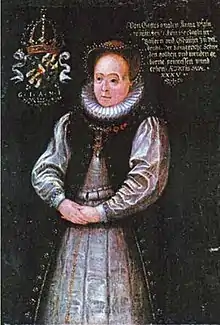
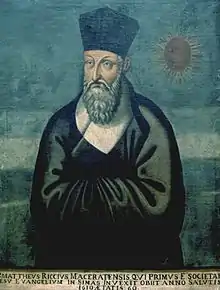
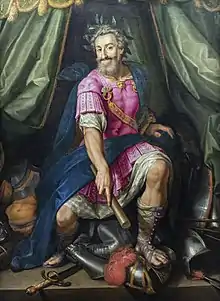
January–March
- January 1
- Cinzio Passeri Aldobrandini, Italian Catholic cardinal (b. 1551)
- François Feuardent, French theologian (b. 1539)
- January 9 – Herman van der Mast, Dutch Renaissance painter from the Northern Netherlands (b. c. 1550)
- January 10 – Mateo de Oviedo, Archbishop of Dublin (b. 1547)
- February 4 – Hannibal Vyvyan, English politician (b. 1545)
- February 5 – Strange Jørgenssøn, Norwegian businessman (b. 1539)
- February 22 – Polykarp Leyser the Elder, German theologian (b. 1552)
- February 27 – Philippe Canaye, French diplomat (b. 1551)
- March 6 – Benedict Pereira, Spanish theologian (b. 1535)
- March 7 – Maria, Abbess of Quedlinburg, German abbess (b. 1571)
- March 19
- Valeriano Muti, Italian Catholic prelate (year of birth unknown)
- Hasegawa Tōhaku, Japanese painter (b. 1539)
- March 20 – Princess Anna Maria of Sweden, Swedish royal (b. 1545)
- March 24 – Henry Cocke, English politician (b. 1538)
- March 28 – Wolfgang, Count of Hohenlohe-Weikersheim, German count (b. 1546)
- March 30 – Thomas Gorges, English knight (b. 1536)
April–June
- April 7 – Hirata Masumune, Japanese samurai (b. 1566)
- April 15 – Robert Parsons, English Jesuit priest (b. 1546)
- April 24 – Anna of Holstein-Gottorp, German noblewoman (b. 1575)
- May 11
- Ikoma Kazumasa, Japanese samurai (b. 1555)
- Matteo Ricci, Italian Jesuit priest and servant of God (b. 1552)
- May 14 – King Henry IV of France, (assassinated) (b. 1553)
- May 17 – Gervase Babington, English churchman (b. 1549)
- May 19 – Thomas Sanchez, Spanish theologian (b. 1550)
- May 27 – François Ravaillac, French assassin of Henry IV of France (executed) (b. 1578)
- June 13 – Thomas Tesdale, English maltster (b. 1547)
July–September
- July – Richard Knolles, English historian (b. 1545)
- July 14 – Francis Solanus, Spanish friar and missionary in South America (b. 1549)
- July 17 – Amandus Polanus, German writer (b. 1561)
- July 18 – Michelangelo Merisi da Caravaggio, Italian painter active in Rome (b. 1571)
- July 22 – Charles I, Duke of Mecklenburg (b. 1540)
- July 27 – Jacob Floris van Langren, Dutch cartographer and globe-maker (b. 1525)
- August 20 – Stanisław Stadnicki, Polish nobleman (b. 1551)
- August 25 – Mabel Browne, Countess of Kildare, Irish noble (b. 1536)
- September 13 – Tomás de Borja y Castro, Spanish Catholic archbishop (b. 1551)
- September 19 – Frederick IV, Elector Palatine (b. 1574)
- September 22 – Jan Moretus, Belgian printer (b. 1543)
October–December
- October 14 – Amago Yoshihisa, Japanese samurai and warlord (b. 1540)
- November 2 – Richard Bancroft, Archbishop of Canterbury (b. 1544)
- November 24 – Duchess Sophie of Prussia, duchess consort of Courland (1609–1610) (b. 1582)
- December 3 – Honda Tadakatsu, Japanese soldier (b. 1548)
- December 10 – John Roberts, Welsh Benedictine monk and priest (b. 1577)
- December 11
- Adam Elsheimer, German artist working in Rome who died at only thirty-two (b. 1578)
- False Dmitry II, pretender to the Russian throne
- December 21 – Catherine Vasa, Swedish princess (b. 1539)
- December 31 – Ludolph van Ceulen, German mathematician (b. 1540)
References
- Alexander More; et al. (May 31, 2017). "Next generation ice core technology reveals true minimum natural levels of lead (Pb) in the atmosphere: insights from the Black Death". Geohealth. 1 (4): 211–219. doi:10.1002/2017GH000064.
- "Anthropocene: New dates proposed for the 'Age of Man'". BBC. March 11, 2015. Retrieved March 12, 2015.
- "Defining the Anthropocene". Nature. March 11, 2015. doi:10.1038/nature14258.
- Palmer, Alan; Veronica (1992). The Chronology of British History. London: Century Ltd. pp. 170–172. ISBN 978-0-7126-5616-0.
- Pope, Hugh (July–October 1910). "The Origin of the Douay Bible". The Dublin Review. 147 (294–295).
